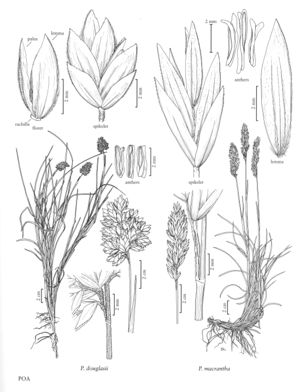Poa douglasii
Plants perennial; loosely tufted, rhizomatous and stoloniferous, rhizomes and stolons to 1 m. Basal branching mainly intravaginal, some extravaginal. Culms (5)10-30 cm tall, 1.2-1.5 mm thick, bases decumbent, terete or weakly compressed, hispidulous beneath the panicles; nodes terete, 0(1) exserted. Sheaths closed for about 1/2 their length, terete, smooth or sparsely to moderately retrorsely scabrous near the collars, glabrous, bases of basal sheaths glabrous, distal sheath lengths 0.9-3.5 times blade lengths; collars sparsely to moderately retrorsely scabrous, glabrous; ligules 1-2 mm, scabrous, truncate to obtuse, ciliolate; innovation blades to 30 cm long, adaxial surfaces moderately to densely scabrous or hispidulous on and between the veins; cauline blades subequal in length, 1-2 mm wide, involute, moderately thick, moderately firm, arcuate, abaxial surfaces smooth or sparsely scabrous, adaxial surfaces moderately to densely scabrous or hispidulous on and between the veins, apices narrowly prow-shaped, flag leaf blades 1-9 cm. Panicles 1.5-6 cm, erect, compact, ovoid, contracted, infrequently interrupted, congested, with 15-50 spikelets; nodes with 1-2 branches, internodes densely hispidulous; branches 0.5-2 cm, erect, stiff, terete to weakly angled, densely hispidulous, with 1-5 spikelets. Spikelets 7-12 mm, lengths to 3 times widths, laterally compressed, not sexually dimorphic; florets 3-6; rachilla internodes usually shorter than 0.5 mm, smooth, glabrous. Glumes broadly lanceolate, 1/2 as long as to subequal to the adjacent lemmas, distinctly keeled; lower glumes 3-veined; upper glumes 4-4.5(7+) mm, 3-veined; calluses usually with a crown of hairs, sometimes glabrous or diffusely webbed; lemmas 5-7.5 mm, lanceolate, 5-veined, distinctly keeled, keels, marginal veins, and sometimes the lateral veins short- to long-villous or softly puberulent, rarely glabrous, lateral veins moderately prominent, intercostal regions smooth, glabrous, margins glabrous, apices acute; palea keels scabrous to pectinate-ciliate, intercostal regions glabrous; anthers vestigial (0.1-0.2 mm) or (2)2.5-3.5 (4) mm. 2n = 28.
Discussion
Poa douglasii is a dioecious endemic that grows on coastal sand dunes in California, a habitat that is being invaded by exotic species. It is rare north of Mendocino. Its hairy rachises distinguish P. douglasii from all other species of Poa in the Flora region. It differs from P. macrantha (see next), which occupies similar habitats, in this and in its usually longer glumes and lemmas.
Selected References
None.
